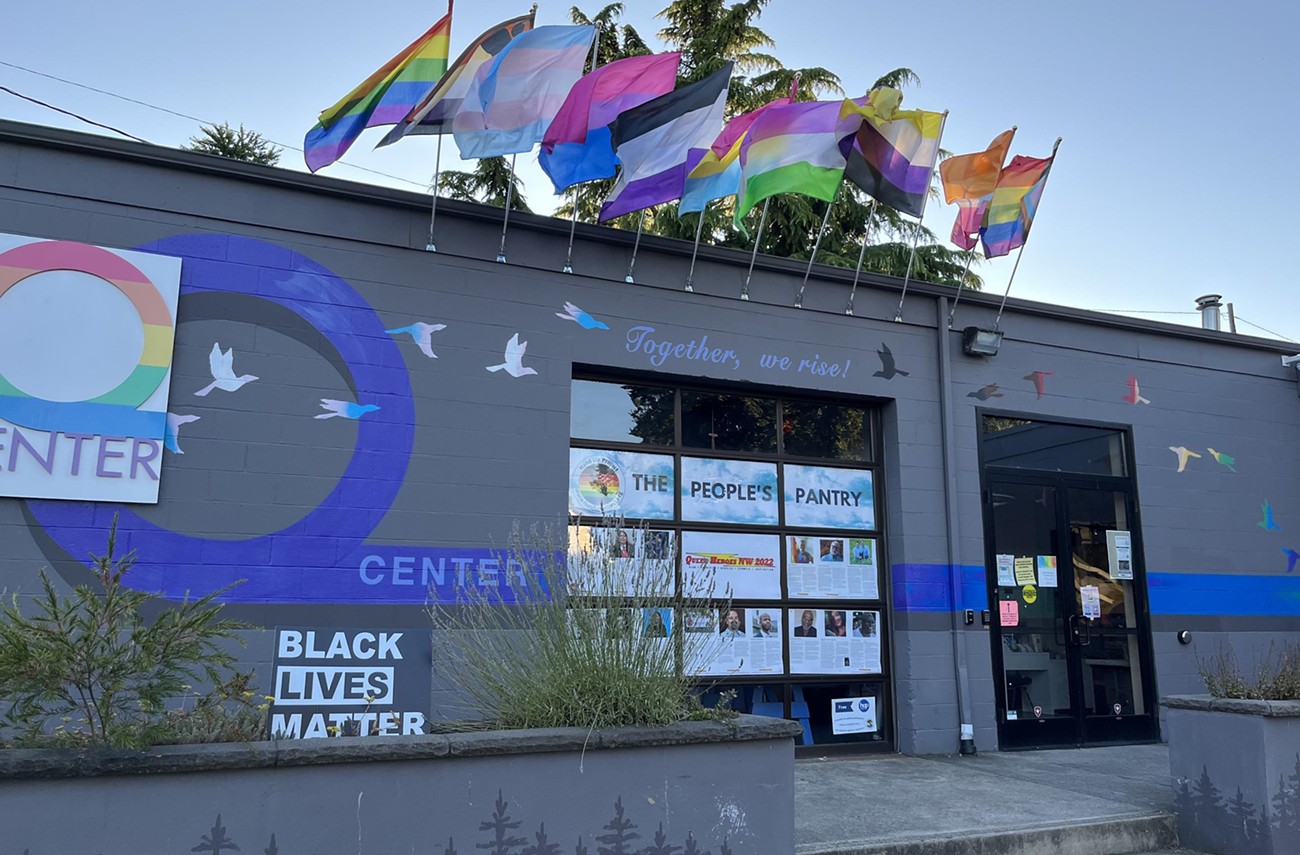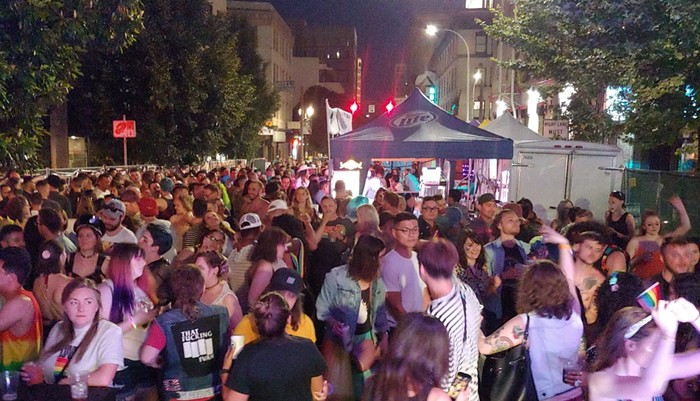The Mercury's 2024 Queer Guide: Endless Queer Summer
Rainbow signs in windows are legion, and Portland's queer summer is endless.
All Pride All the Time
There’s something happening every weekend, as we count down to Portland Pride!
Kathleen Hanna Is Making a Documentary About Darcelle XV
Fun fact: The riot grrrl punk singer is Walter Cole's second cousin.
Q Marks the Spot
For two decades, the Q Center has been a safe haven for the LGBTQ2SIA+ community—and they have even bigger dreams for the future.
Find Queer Comedy Tonight!
Our roundup of the best queer (and queer adjacent) comedy shows in Portland.
We Are in Cinema's Golden Age of the Lesbian Dirtbag
Celebrate Pride with lesbian cinema! Without crying, for once!
EverOut's 2024 Pride Event Calendar
Don't miss a minute of fun during this year's Queer Summer!
QUEER PUZZLE PAGE!
You don't have to be queer to figure out these puzzles... but it helps!
This Portland Gay Bar Is Opening a Family-Friendly LGBTQIA+ Lounge
Since spring, we've wondered about "Scandals East." Here's the plan.
THE TRASH REPORT: Pride Edition
Target Is Canonically Gay! Did the Founding Fathers Kiss Dudes?
A Portland Drag Clown in Residence at the Venice Biennale
Artist Jeffery Gibson invited Carla Rossi to climb his installation on the US pavilion.
Queer Bars in Portland, a History
Silverado was once Flossie's; Lowensdale Park was once a place to cruise—take a brief dive into a history of our city's queer spaces.
Mona Chrome Is—Ironically Enough—a "Walking Crayon Box"
Gary Barnes sees drag as a way to combine their passions for painting, costume design, and dance—all at once!
Cocktail-Coded
Northeast Portland neighborhood wine bar Bonne Chance built a queer clientele on allyship and Malört.
Queer Guide Comic: COVID-Safer Pride Guide
Protect your ability to party—and protest—this Pride!
Queer Eye for the Pedalpalooza Ride
Portland leads the way in welcoming riders of all genders and sexualities.
The Long Road to Justice
As the American legal landscape for LGBTQ+ residents grows hostile, Oregon works to enshrine rights for all.
Where to Find a Queer-Owned Bar or Restaurant Near You
Fourteen spots to try during Portland Pride Summer—and beyond!
The Future of HIV Treatment Is Injectable
Promising prugs could expand treatment–if we get out of our own way.
[Find the Mercury's Queer Guide in print—available in more than 500 spots citywide!—eds.]
Even though it’s currently only open by appointment at its longtime home on North Mississippi, the Q Center’s building, shuttered for two years during the height of the COVID-19 pandemic, is full of life.
The LGBTQ2SIA+ community center, which is celebrating its 20th year of existence, hosts a wide array of support groups for queer community members and a walk-in, grocery shopping-style food pantry for people struggling with food scarcity. It has also begun hosting self-defense classes and running a fund to support transgender Black and Indigenous people.
But big changes are on the horizon. Chaz Vitale, the board chair of the organization, said the Q Center’s Board is currently reworking the structure of the organization—with an eye towards moving out of its rented home on Mississippi and acquiring a building of its own.
“The Q Center has been a meeting space with tenants who are renting out spaces within it that are also non-profits serving the community, and the feedback we’ve gotten as board members from the community at large has been about a dream of more programming, more events, more ways to gather—and the capacity for the building doesn’t really support that,” Vitale said.
The Q Center wants to create a collaboration between a core group of LGBTQ+ non-profits and give them a hand in shaping the organization’s future, centering communities of color and attempting to make its space more accessible to working class people and people with disabilities.
“We’ve reached out to a number of people and are in initial talks about who we might get to partner with, but there’s so much positive momentum,” Vitale said. “It feels very much like an idea that’s long overdue.”
The current plan is for the Q Center to remain in its current building through September of next year, and use the intervening time to solidify its core group of member organizations, fundraise, and secure a new location that may be bigger, have more parking options, and give the organization more financial security.
It’s an exciting prospect for the Q Center, which opened its doors at a time when there were very few LGBTQ+ spaces in Portland.
Angela Carter, a naturopathic doctor who co-founded the Equi Center as a clinic within the Q Center in 2016, said that while queer community members used to gather at businesses like the Three Friends Coffee House or the feminist community center In Other Words, nothing like the Q Center existed.
“I was super excited, mostly because I knew they were offering a lot of services to queer youth—and that was really crucial,” Carter said. “In Portland we didn’t have any centralized place for queer and trans community to gather. Historically, it’s been the bars.”
In the years since the Q Center’s founding and move to North Portland, the local landscape for LGBTQ+ people has changed dramatically. Carter said that, in some ways, Portland now is a “post-queer” city, one in which queer visibility is no longer a major site of political struggle.
But even as the LGBTQ+ community has made strides in Portland and across Oregon, the political situation for queer people in states across the country has taken a dramatic turn for the worse. According to the Human Rights Campaign, 39 percent of transgender youth currently live in one of the 25 states that have passed bans on gender-affirming care.
That assault on trans youth and trans people more broadly has led to a wave of migration into states with legal protections and more welcoming environments, including Oregon—which, according to a recent study from UCLA, has a higher percentage of LGBTQ+ individuals than any other state in the nation.
The influx of new migrants, who Carter referred to as “refugees,” has only highlighted the importance of community gathering spaces like the Q Center.
“We’ve seen a huge influx of people who are coming—just showing up. They don’t have resources, they don’t have connections, they don’t know anyone, they don’t have a place to land,” Carter said. “We really need a concerted support network for the people who are coming to help them get housing, to help them find out how they can get healthcare, to just support them.”
Vitale noted that the visibility of a place like the Q Center may be particularly important in a city like Portland that does not have a clearly defined queer neighborhood—a positive thing in that much of the city is relatively safe, but a complicating factor for new arrivals who want to connect with resources and community members.
The accessibility of housing for new arrivals, especially people who have moved to the area without employment lined up, is a primary concern.
“It’s so expensive to live here,” Carter said. “When I first moved here, I was paying $300 for a room in a house—and that’s just unimaginable at this point.”
It’s not just permanent housing that is challenging to find. Carter also noted that the city currently has a dearth of safe shelter options for trans residents, meaning even finding a stop-gap housing solution can be challenging.
The influx of new arrivals has also stretched the healthcare system. Even though the Portland area has a number of providers who offer healthcare for trans people, and while the state covers much of that care under the Oregon Health Plan, the Portland area does not have nearly enough providers to meet the growing demand.
“The wait [for care] has gone from being six months to a year, to being a year-and-a-half to two years long,” Vitale said.
The wait for people attempting to access healthcare illustrates a broader challenge: as accepting as Oregon is, as many legal protections as it has, it is not yet a place where many queer people can easily access the supports they need to live and thrive—even though, given what is happening in so many other states, it needs to be.
In that environment, places like the Q Center may become even more vital.
“Ideally, what is a community center? It’s a place that people can go and find resources, connect with community, meet people like them, get support in the areas they need support in, and… build something that actually works for us,” Vitale said. “What Q Center is trying to do right now is definitely a step in that direction.”




















